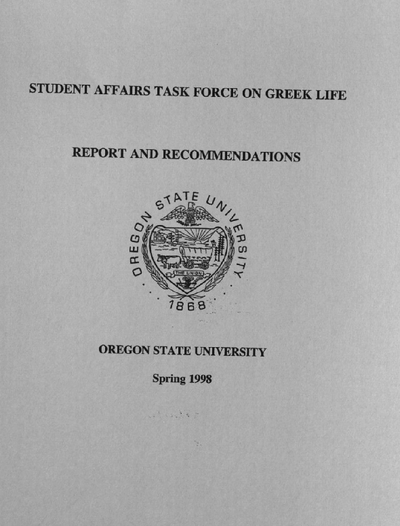In 1966, Eugene Okino, a third generation Japanese-American from Portland, sought to join the Beta Pi chapter of the national fraternity Sigma Chi at Oregon State College. The national fraternity removed its whites-only clause in 1961 with the unanimous support of Beta Pi’s active student members, which was consistent with Oregon’s commitment to end discrimination on all of its college and university campuses. Four years before the Civil Rights Act of 1964, Oregon’s State Board of Higher Education stated its intentions to “oppose and prevent...all discrimination based on race, color or religion.” A year later, elaborating on this commitment, they stated “that after January 1, 1963, the University and Oregon State College shall withdraw recognition of any fraternity or sorority whose national charter then requires local chapters to restrict their membership on the basis of race or religion.”
When the Beta Pi chapter polled national alumni about whether to admit Eugene Okino, a single objection among the more than nine hundred respondents lead to the delay of Okino’s initiation while OSC President James Jensen formed a review committee to investigate and resolve the matter. In the end, Eugene Okino was allowed to join the Beta Pi chapter, and the controversy led to OSC and the State Board of Higher Education taking an even stronger position against discriminatory practices within campus organizations. They also took steps to ensure that fraternities and sororities maintained local autonomy so that national loopholes would not cause future problems.
Fraternities at Oregon State College began removing racial restrictions in 1947 when the Blue Key National Honor Fraternity removed the “White Caucasian” clause from its membership policies. By 1953, seventeen of the thirty fraternities on campus had removed racial, color, and religious restriction clauses. By 1960, twenty-six out of thirty-one campus fraternities had adopted such clauses, and by 1963, thirty-one of thirty-three fraternities associated with Oregon State College were a part of national fraternities that had removed discriminatory restrictions; the remaining two fraternities had received exemptions from following their national policies.
When the Beta Pi chapter of Sigma Chi sought to initiate Eugene Okino in the fall of 1966, these commitments to removing discrimination and honoring local autonomy clashed with a loophole that remained in the national Sigma Chi Fraternity’s constitution. The organization had removed its whites-only clause in 1961, but their constitution - revised again in 1965 -- still allowed for the denial of membership to “any person who for any reason is likely to be considered personally unacceptable as a brother by any chapter or any member anywhere.” This clause conflicted with the anti-discrimination policies of the Oregon State Board of Higher Education and Oregon State Colleges requirement of local autonomy in the decision making of campus organizations, including fraternities.

